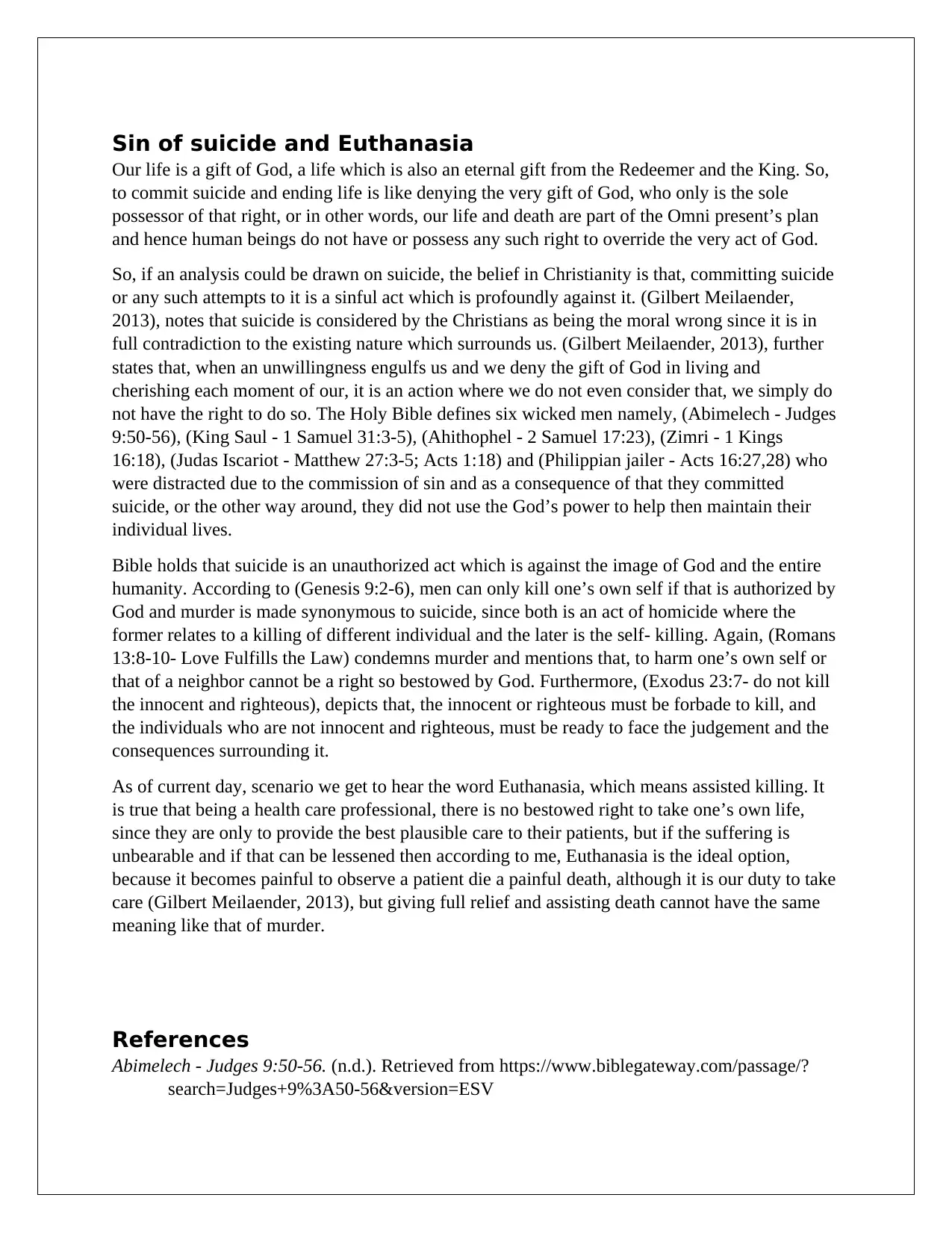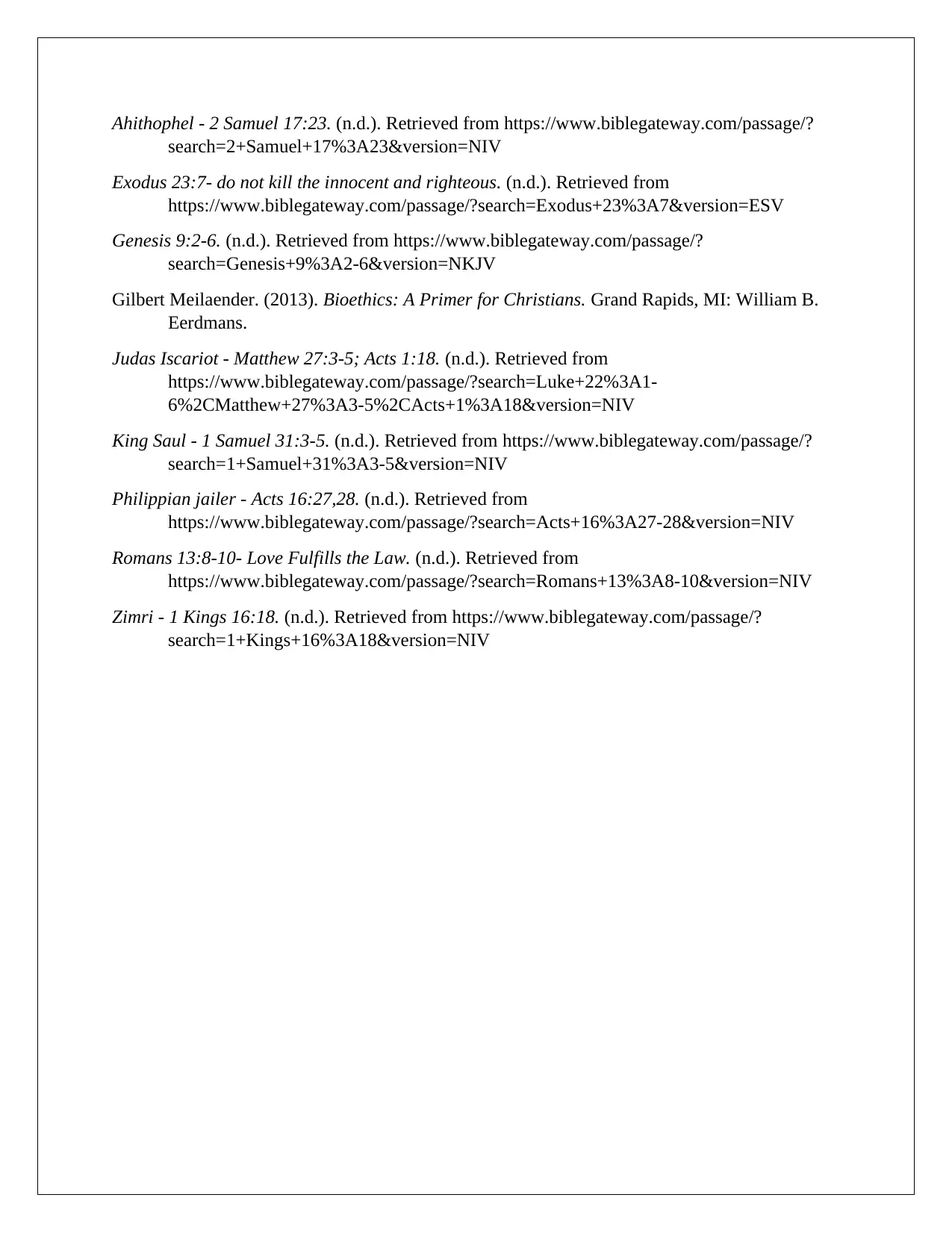Sin of Suicide and Euthanasia
VerifiedAdded on 2019/10/01
|2
|833
|147
Essay
AI Summary
This essay examines the Christian perspective on suicide and euthanasia. It argues that suicide is a sin, contradicting God's gift of life, citing biblical examples of individuals who committed suicide due to sin. The essay references specific biblical passages (Genesis 9:2-6, Exodus 23:7, Romans 13:8-10) to support the claim that taking one's own life is unauthorized and against God's will. While acknowledging the role of healthcare professionals in providing care, the essay presents a nuanced view on euthanasia, suggesting that alleviating unbearable suffering might be considered differently from murder. The essay concludes by emphasizing the importance of respecting the sanctity of life as a gift from God.

Sin of suicide and Euthanasia
Our life is a gift of God, a life which is also an eternal gift from the Redeemer and the King. So,
to commit suicide and ending life is like denying the very gift of God, who only is the sole
possessor of that right, or in other words, our life and death are part of the Omni present’s plan
and hence human beings do not have or possess any such right to override the very act of God.
So, if an analysis could be drawn on suicide, the belief in Christianity is that, committing suicide
or any such attempts to it is a sinful act which is profoundly against it. (Gilbert Meilaender,
2013), notes that suicide is considered by the Christians as being the moral wrong since it is in
full contradiction to the existing nature which surrounds us. (Gilbert Meilaender, 2013), further
states that, when an unwillingness engulfs us and we deny the gift of God in living and
cherishing each moment of our, it is an action where we do not even consider that, we simply do
not have the right to do so. The Holy Bible defines six wicked men namely, (Abimelech - Judges
9:50-56), (King Saul - 1 Samuel 31:3-5), (Ahithophel - 2 Samuel 17:23), (Zimri - 1 Kings
16:18), (Judas Iscariot - Matthew 27:3-5; Acts 1:18) and (Philippian jailer - Acts 16:27,28) who
were distracted due to the commission of sin and as a consequence of that they committed
suicide, or the other way around, they did not use the God’s power to help then maintain their
individual lives.
Bible holds that suicide is an unauthorized act which is against the image of God and the entire
humanity. According to (Genesis 9:2-6), men can only kill one’s own self if that is authorized by
God and murder is made synonymous to suicide, since both is an act of homicide where the
former relates to a killing of different individual and the later is the self- killing. Again, (Romans
13:8-10- Love Fulfills the Law) condemns murder and mentions that, to harm one’s own self or
that of a neighbor cannot be a right so bestowed by God. Furthermore, (Exodus 23:7- do not kill
the innocent and righteous), depicts that, the innocent or righteous must be forbade to kill, and
the individuals who are not innocent and righteous, must be ready to face the judgement and the
consequences surrounding it.
As of current day, scenario we get to hear the word Euthanasia, which means assisted killing. It
is true that being a health care professional, there is no bestowed right to take one’s own life,
since they are only to provide the best plausible care to their patients, but if the suffering is
unbearable and if that can be lessened then according to me, Euthanasia is the ideal option,
because it becomes painful to observe a patient die a painful death, although it is our duty to take
care (Gilbert Meilaender, 2013), but giving full relief and assisting death cannot have the same
meaning like that of murder.
References
Abimelech - Judges 9:50-56. (n.d.). Retrieved from https://www.biblegateway.com/passage/?
search=Judges+9%3A50-56&version=ESV
Our life is a gift of God, a life which is also an eternal gift from the Redeemer and the King. So,
to commit suicide and ending life is like denying the very gift of God, who only is the sole
possessor of that right, or in other words, our life and death are part of the Omni present’s plan
and hence human beings do not have or possess any such right to override the very act of God.
So, if an analysis could be drawn on suicide, the belief in Christianity is that, committing suicide
or any such attempts to it is a sinful act which is profoundly against it. (Gilbert Meilaender,
2013), notes that suicide is considered by the Christians as being the moral wrong since it is in
full contradiction to the existing nature which surrounds us. (Gilbert Meilaender, 2013), further
states that, when an unwillingness engulfs us and we deny the gift of God in living and
cherishing each moment of our, it is an action where we do not even consider that, we simply do
not have the right to do so. The Holy Bible defines six wicked men namely, (Abimelech - Judges
9:50-56), (King Saul - 1 Samuel 31:3-5), (Ahithophel - 2 Samuel 17:23), (Zimri - 1 Kings
16:18), (Judas Iscariot - Matthew 27:3-5; Acts 1:18) and (Philippian jailer - Acts 16:27,28) who
were distracted due to the commission of sin and as a consequence of that they committed
suicide, or the other way around, they did not use the God’s power to help then maintain their
individual lives.
Bible holds that suicide is an unauthorized act which is against the image of God and the entire
humanity. According to (Genesis 9:2-6), men can only kill one’s own self if that is authorized by
God and murder is made synonymous to suicide, since both is an act of homicide where the
former relates to a killing of different individual and the later is the self- killing. Again, (Romans
13:8-10- Love Fulfills the Law) condemns murder and mentions that, to harm one’s own self or
that of a neighbor cannot be a right so bestowed by God. Furthermore, (Exodus 23:7- do not kill
the innocent and righteous), depicts that, the innocent or righteous must be forbade to kill, and
the individuals who are not innocent and righteous, must be ready to face the judgement and the
consequences surrounding it.
As of current day, scenario we get to hear the word Euthanasia, which means assisted killing. It
is true that being a health care professional, there is no bestowed right to take one’s own life,
since they are only to provide the best plausible care to their patients, but if the suffering is
unbearable and if that can be lessened then according to me, Euthanasia is the ideal option,
because it becomes painful to observe a patient die a painful death, although it is our duty to take
care (Gilbert Meilaender, 2013), but giving full relief and assisting death cannot have the same
meaning like that of murder.
References
Abimelech - Judges 9:50-56. (n.d.). Retrieved from https://www.biblegateway.com/passage/?
search=Judges+9%3A50-56&version=ESV
Paraphrase This Document
Need a fresh take? Get an instant paraphrase of this document with our AI Paraphraser

Ahithophel - 2 Samuel 17:23. (n.d.). Retrieved from https://www.biblegateway.com/passage/?
search=2+Samuel+17%3A23&version=NIV
Exodus 23:7- do not kill the innocent and righteous. (n.d.). Retrieved from
https://www.biblegateway.com/passage/?search=Exodus+23%3A7&version=ESV
Genesis 9:2-6. (n.d.). Retrieved from https://www.biblegateway.com/passage/?
search=Genesis+9%3A2-6&version=NKJV
Gilbert Meilaender. (2013). Bioethics: A Primer for Christians. Grand Rapids, MI: William B.
Eerdmans.
Judas Iscariot - Matthew 27:3-5; Acts 1:18. (n.d.). Retrieved from
https://www.biblegateway.com/passage/?search=Luke+22%3A1-
6%2CMatthew+27%3A3-5%2CActs+1%3A18&version=NIV
King Saul - 1 Samuel 31:3-5. (n.d.). Retrieved from https://www.biblegateway.com/passage/?
search=1+Samuel+31%3A3-5&version=NIV
Philippian jailer - Acts 16:27,28. (n.d.). Retrieved from
https://www.biblegateway.com/passage/?search=Acts+16%3A27-28&version=NIV
Romans 13:8-10- Love Fulfills the Law. (n.d.). Retrieved from
https://www.biblegateway.com/passage/?search=Romans+13%3A8-10&version=NIV
Zimri - 1 Kings 16:18. (n.d.). Retrieved from https://www.biblegateway.com/passage/?
search=1+Kings+16%3A18&version=NIV
search=2+Samuel+17%3A23&version=NIV
Exodus 23:7- do not kill the innocent and righteous. (n.d.). Retrieved from
https://www.biblegateway.com/passage/?search=Exodus+23%3A7&version=ESV
Genesis 9:2-6. (n.d.). Retrieved from https://www.biblegateway.com/passage/?
search=Genesis+9%3A2-6&version=NKJV
Gilbert Meilaender. (2013). Bioethics: A Primer for Christians. Grand Rapids, MI: William B.
Eerdmans.
Judas Iscariot - Matthew 27:3-5; Acts 1:18. (n.d.). Retrieved from
https://www.biblegateway.com/passage/?search=Luke+22%3A1-
6%2CMatthew+27%3A3-5%2CActs+1%3A18&version=NIV
King Saul - 1 Samuel 31:3-5. (n.d.). Retrieved from https://www.biblegateway.com/passage/?
search=1+Samuel+31%3A3-5&version=NIV
Philippian jailer - Acts 16:27,28. (n.d.). Retrieved from
https://www.biblegateway.com/passage/?search=Acts+16%3A27-28&version=NIV
Romans 13:8-10- Love Fulfills the Law. (n.d.). Retrieved from
https://www.biblegateway.com/passage/?search=Romans+13%3A8-10&version=NIV
Zimri - 1 Kings 16:18. (n.d.). Retrieved from https://www.biblegateway.com/passage/?
search=1+Kings+16%3A18&version=NIV
1 out of 2
Your All-in-One AI-Powered Toolkit for Academic Success.
+13062052269
info@desklib.com
Available 24*7 on WhatsApp / Email
![[object Object]](/_next/static/media/star-bottom.7253800d.svg)
Unlock your academic potential
© 2024 | Zucol Services PVT LTD | All rights reserved.

